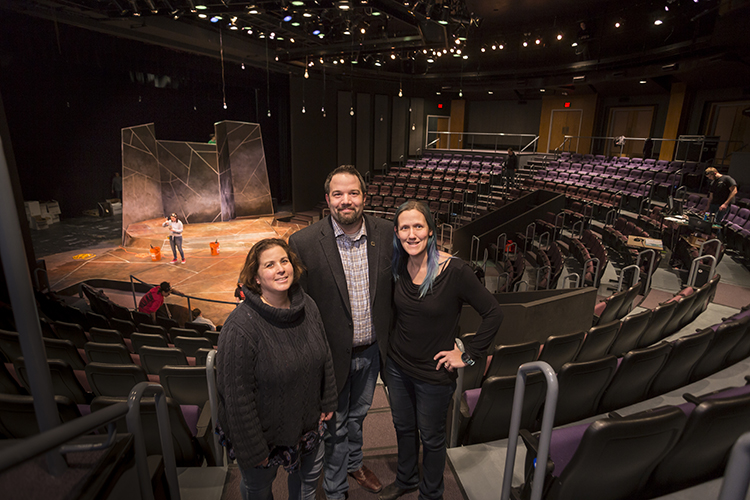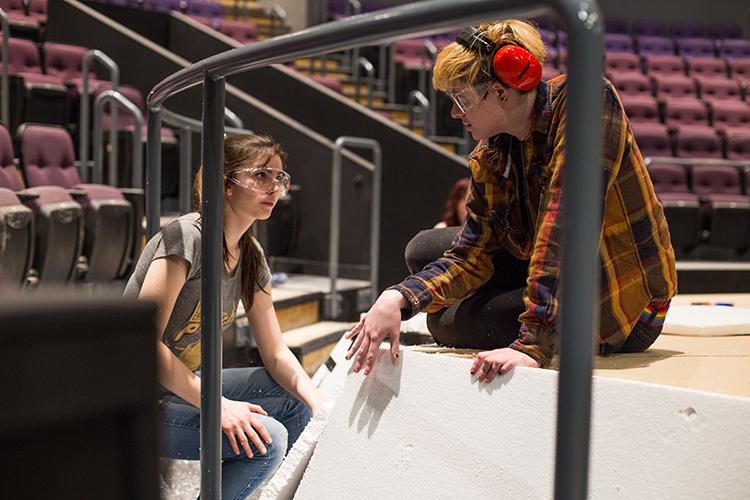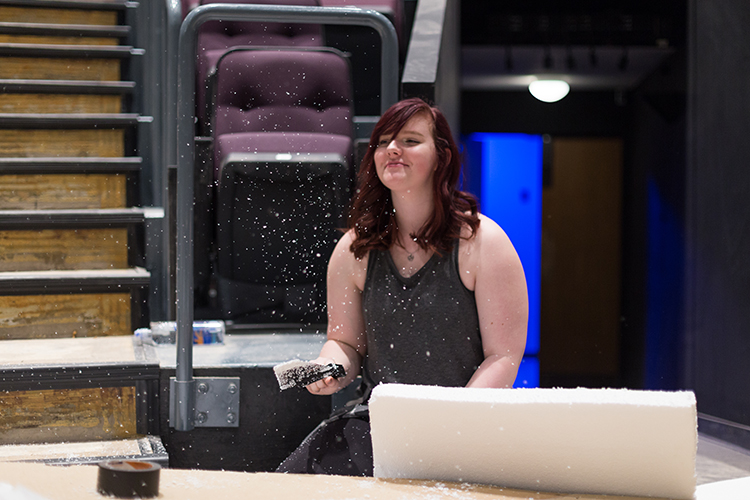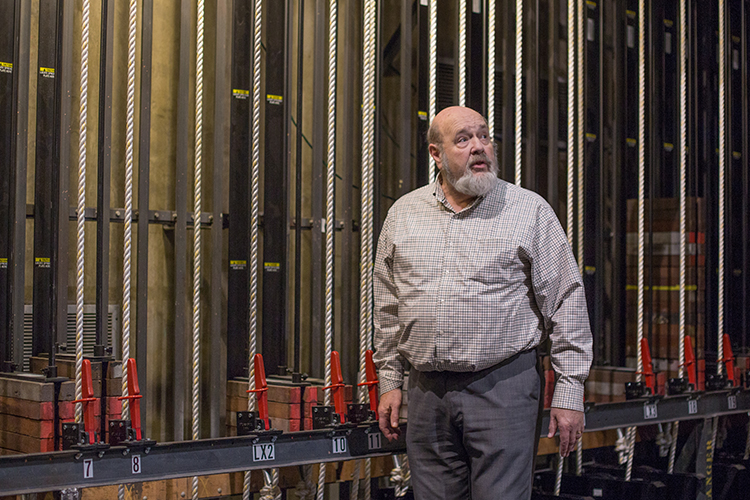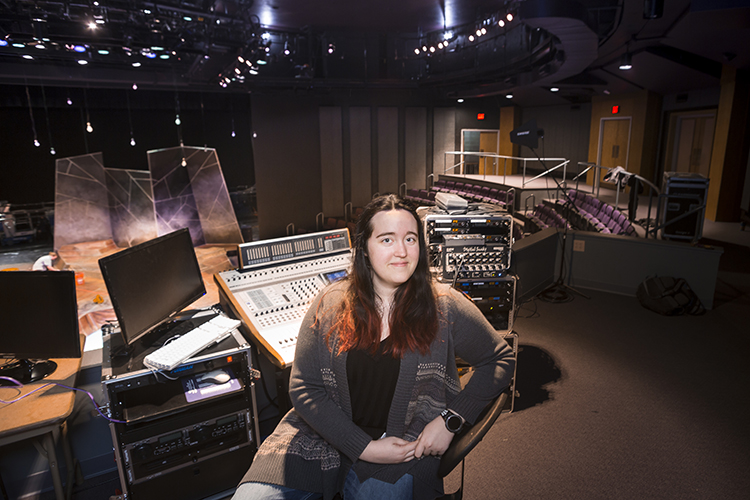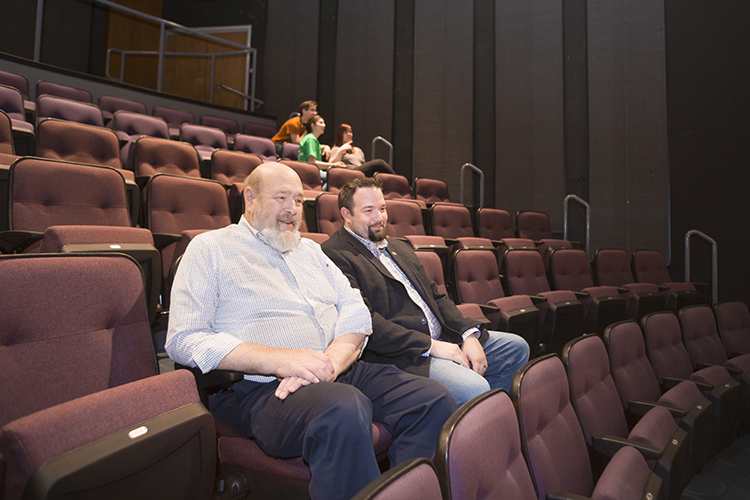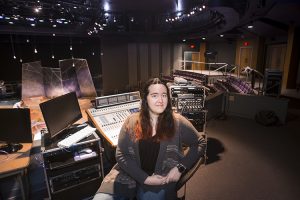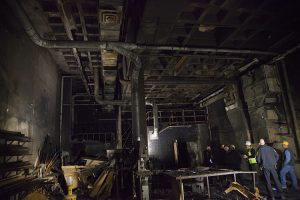Eleven months have passed since the doors of the Mainstage Theatre were open to the public. For a building that has been a hub of live dance and theater for half a century, the empty stage on the eastern edge UWM’s campus has taken some getting used to.
No longer. Wednesday, March 7, the theater springs back to life with a performance of the drama “12 Ophelias.” Not just restored, the theater brims with improvements such as new acoustics and seating, and a flexible floor plan that brings the venue nearly into compliance with the Americans With Disabilities Act for the first time.
The journey from the building’s forced closure after an accidental fire on April 8, 2017, to its reopening this week is itself a dramatic story of how art, trust and collaboration triumphed over adversity.
The ruins
A fixture in the Peck School of the Arts since 1980, LeRoy Stoner knows the theater building better than anyone, colleagues say, from its costume shops and orchestra pit to seven elevator lifts and the equipment-laden machine shop backstage.
Last spring’s fire started there, about 90 minutes after students left for the evening, following a busy day of rehearsals and tech work for a scheduled performance of “Arcadia.” All safety procedures had been followed; the injury-free fire was ruled accidental. “We were in a 1967-era building with electrical tools from 1967,” Peck School of the Arts Dean Scott Emmons said. “Unfortunately, this is one of those things that can happen when you have that mix of old and new and sawdust and heat.”
“A theater is an intensely used building,” added Stoner.
The restoration
But the show did go on. Within two days, 180 classes in the Peck School’s five departments had been rescheduled and 180 restoration specialists had combed through the theater to triage destroyed equipment and salvage damaged items.
The school’s 1,600 students did their part, too. “Their passion and ability to take their emotions, set them aside and do what was needed to be successful was astounding,” said Jessica Berlin Krivsky, part of a five-person team charged with rescheduling classes and performances in the damaged Arts, Music and Mainstage buildings.
“As a professional experience, it was great to be able to reblock and flip an entire show into a different venue in less than two weeks,” said Peck senior Brooke Olson, who helped oversee the transition of “Arcadia” from the damaged Mainstage to the Milwaukee Repertory Theater last spring. “I’m good at problem-solving on the fly because I had to do it for the show.”
That flexibility and ingenuity, Stoner said, is a foundational professional skill for aspiring performers and technicians in the arts professions and in other fields where Peck School alumni find themselves after graduation day.
“I have no doubt about a theater major finding work,” he said. “They’re developing skills in communication, working in small groups, identifying deadlines and projects that build toward major goals. The real benefit, I think, in being a theater major is that development of the overall person to be able to do a wider variety of things.”
Improved accessibility and technology
The renovations have literally cleared the way for more students to participate in sound engineering and stagecraft coursework in the program.
First, there was the “moral imperative” of dipping into the Peck School’s budget to pay for above-and-beyond renovations that created flexible spaces for students who use wheelchairs and other adaptive equipment to get around the theater’s tight corners and raised platforms.
The sound booth is now a portable setup in the back of the house, allowing for improved acoustics and accessibility. Before the fire, it was an enclosed booth dozens of steps above the main body of the theater.
As for the technical improvements, “It’s impossible to replace a 1967 lighting system with a 1967 lighting system in 2018,” said Emmons. The newly installed lighting system is energy efficient and compatible with what students will be using in part-time jobs and internships they take on as theater majors.
The final price tag attached to fire damages and the restoration is just over $5 million, mostly covered by insurance.
“We did put the theater back in a better place than it was,” said Berlin Krivsky. “The state of theater itself has grown and changed so much that it’s nice that we’ve caught up with it. I wish it wasn’t under these circumstances, but the reopened theater is a huge benefit for the program and our students.”
Epilogue
Nostalgia, excitement and sawdust are circulating in the building as final preparations are underway for the March 7-11 run of “12 Ophelias” in the Mainstage Theatre.
Emmons said the team from Paul Davis Restoration and volunteers and supporters from Shorewood High School and the Milwaukee Rep are being invited back to enjoy a revived space and a refreshed program that they helped make possible.
In May, Olson will get a second chance at a rite of passage for the program’s senior stage management students: She’ll stage-manage the spring musical “9 to 5,” under director Tony Horne.
“I feel a lot closer to the people I went through the program with as we grieved the loss of a space we called home,” she said. “Now, we get to breathe new life into a new home. I learned that the theater community in this building and across Milwaukee is very strong.”
On opening night, Trumbull-Holper and Stoner will sit, side by side, in the theater’s new seats and watch the show go on. “The challenge was always to put this space back together in a way that respects the history but gives something new for the future,” said Trumbull-Holper. “I think we accomplished that.”
Tickets and more information
The reopening of the Mainstage Theatre coincides with the March 7 to 11 run of “12 Ophelias.” The next scheduled performance is the musical “9 to 5,” running May 2-6. For tickets to “12 Ophelias” or “9 to 5,” go to the Peck School of the Arts box office online or call 414-229-4308. Later this spring, the Peck School will announce a grand-reopening Shakespeare production scheduled for fall 2018, and featuring guest performers and a guest director.
